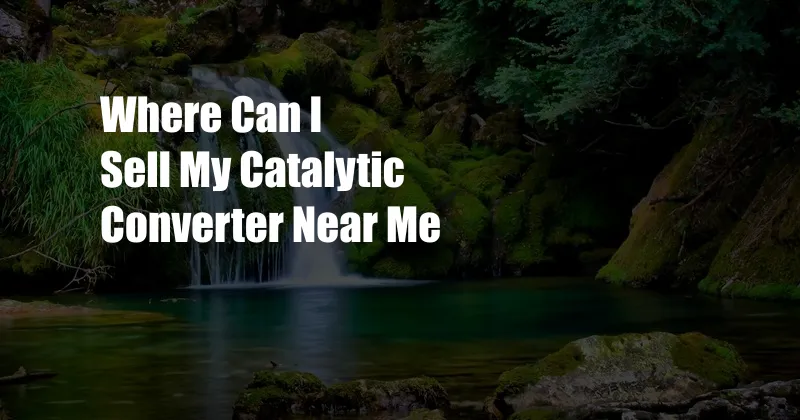
Where Can I Sell My Catalytic Converter Near Me?
A Comprehensive Guide to Scrapping Your Converter for Cash
Catalytic converters, indispensable components of modern vehicles, play a pivotal role in reducing harmful emissions. As a result, they contain valuable metals like platinum, palladium, and rhodium. If you find yourself with a faulty or unwanted catalytic converter, scrapping it can be a lucrative option.
Selling your catalytic converter requires finding the right buyer who can offer a fair price. While many options are available, determining where to sell your catalytic converter for maximum returns can be overwhelming. This comprehensive guide will provide you with the necessary information and tips to help you navigate the process and ensure a successful transaction.
Understanding Catalytic Converters
Catalytic converters are exhaust emission control devices that convert harmful pollutants into less toxic gases. They contain precious metals like platinum, palladium, and rhodium, which act as catalysts to facilitate chemical reactions.
Over time, catalytic converters may deteriorate due to various factors, including:
- Age and wear
- Exposure to extreme temperatures
- Engine issues
When a catalytic converter becomes faulty, it may affect the vehicle’s performance and trigger emissions-related warning lights.
Finding Buyers for Your Catalytic Converter
When seeking buyers for your catalytic converter, it’s essential to research and compare different options. Here are some of the most common channels:
- Auto Parts and Recycling Yards: Local auto parts stores and recycling yards often purchase catalytic converters as scrap metal. They typically offer a quick and convenient process but may not provide the highest prices.
- Online Marketplaces: Platforms like eBay and Craigslist allow you to connect with buyers from a broader area. While this approach provides more flexibility, it requires handling shipping and ensuring the safe delivery of the converter.
- Specialized Catalytic Converter Buyers: Certain businesses focus exclusively on purchasing catalytic converters. They often offer competitive prices and expertise in evaluating the converter’s value based on its type, condition, and metal content.
Tips for Maximizing Returns
To maximize the value you receive for your catalytic converter, follow these expert tips:
- Identify Your Converter’s Type: Different types of catalytic converters contain varying amounts of precious metals. Determine the type of converter you have to ensure you’re getting a fair price.
- Prepare Your Converter: Remove any attached parts or debris from the converter to make it easier to assess its condition and value.
- Get Multiple Quotes: Contact several buyers to obtain multiple quotes. This allows you to compare prices and choose the best offer.
- Negotiate the Price: Don’t hesitate to negotiate the price with buyers, especially if you have a high-value converter or have obtained multiple quotes.
Frequently Asked Questions (FAQs)
Q: How much can I get for my catalytic converter?
A: The value of a catalytic converter depends on several factors, including its type, condition, and metal content. Prices fluctuate based on market demand and availability.
Q: Do I need to remove the catalytic converter myself?
A: In most cases, it’s recommended to have a mechanic remove the catalytic converter for safety and liability reasons.
Q: Can I sell a stolen catalytic converter?
A: Selling stolen catalytic converters is illegal and highly discouraged. It’s important to ensure you have legal ownership of the converter before selling it.
Conclusion
Selling your catalytic converter can be a profitable endeavor if you follow the right steps. By understanding the process, finding reputable buyers, and maximizing returns, you can ensure a successful transaction. Whether you choose to sell to a local auto parts store, an online marketplace, or a specialized catalytic converter buyer, remember to do your research, prepare your converter, and negotiate to get the best possible price.
Are you interested in learning more about catalytic converters or have any specific questions?